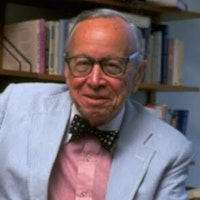For hope of the future surely lies in the revival of the [Vital] Center – in the triumph of those who believe deeply in civil liberties, in constitutional processes and in the democratic determination of political and economic policies.
For hope of the future surely lies in the revival of the [Vital] Center—in the triumph of those who believe deeply in civil liberties, in constitutional processes and in the democratic determination of political and economic policies.
Arthur M. Schlesinger Jr.

A Vital Center
Topic: Justice, Vision, & Leadership
For hope of the future surely lies in the revival of the [Vital] Center – in the triumph of those who believe deeply in civil liberties, in constitutional processes and in the democratic determination of political and economic policies. And, in direct consequence, the main target of both totalitarian extremes must be the Center–the group which holds society together. Neither fascism [far right/totalitarianism] nor communism [far left/totalitarianism] can win so long as there remains a democratic middle way, which unites hope of freedom and of economic abundance; so the destruction of the middle way becomes the first priority for both…. The pattern of the conspiracy against the Center is repeated throughout the world.
Yeats long ago had an apocalyptic vision: Things fall apart; the center cannot hold; Mere anarchy is loosed upon the world, The blood-dimmed tide is loosed, and everywhere The ceremony of innocence is drowned; The best lack all conviction, while the worst Are full of passionate intensity.
The problem of the United States policy is to make sure that the Center does hold; and this can be done only by supporting it against all blandishments and all threats, from whatever direction they may come. The best must recover a sense of principle; and, on the basis of principle, they may develop a passionate intensity. We cannot afford to loose the blood-dimmed tide ever again.
Arthur Meier Schlesinger Jr., born Arthur Bancroft Schlesinger; October 15, 1917 – February 28, 2007) was an American historian, social critic, and public intellectual. The son of the influential historian Arthur M. Schlesinger Sr. and a specialist in American history, much of Schlesinger's work explored the history of 20th-century American liberalism. In particular, his work focused on leaders such as Harry S. Truman, Franklin D. Roosevelt, John F. Kennedy, and Robert F. Kennedy. In the 1952 and 1956 presidential campaigns, he was a primary speechwriter and adviser to the Democratic presidential nominee, Adlai Stevenson II, both times.[3] Schlesinger served as special assistant and "court historian"[4] to President Kennedy from 1961 to 1963. He wrote a detailed account of the Kennedy administration, from the 1960 presidential campaign to the president's state funeral, titled A Thousand Days: John F. Kennedy in the White House, which won the 1966 Pulitzer Prize for Biography or Autobiography.
A Vital Center
Schlesinger, Arthur M. “Not Left, Not Right, But a Vital Center; The Hope of the Future Lies in the Widening and Deepening of the Democratic Middle Ground.” The New York Times, The New York Times, 4 Apr. 1948, www.nytimes.com/1948/04/04/archives/not-left-not-right-but-a-vital-center-the-hope-of-the-future-lies.html, pp. 5-6 [Arthur M. Schlesinger Jr. (Not Left, Not Right, But a Vital Center - April 4, 1948)].

Arthur M. Schlesinger Jr.
Theme: A Vision of America

About This Arthur Schlesinger Quotation [Commentary]
Arthur Schlesinger states the charge directly: “the hope of the future surely lies in the revival of the [Vital] Center—in the triumph of those who believe deeply in civil liberties, in constitutional processes and in the democratic determination of political and economic policies.” The Center, in his sequence of ideas, is not a bland midpoint; it is the coalition that keeps public life under law and consent. Read as A Vision of America, his words invite women and men—people of every gender—to keep disagreement within “constitutional processes” so that power remains answerable to the people.
He adds the warning that “the main target of both totalitarian extremes must be the Center—the group which holds society together.” “Neither fascism nor communism can win so long as there remains a democratic middle way, which unites hope of freedom and of economic abundance; so the destruction of the middle way becomes the first priority for both.” The Yeats line—“the center cannot hold… The best lack all conviction, while the worst are full of passionate intensity”—is the danger Schlesinger means to prevent by protecting the Center that links liberty with material wellbeing.
Hence the practical task: “The problem of the United States policy is to make sure that the Center does hold; and this can be done only by supporting it against all blandishments and all threats, from whatever direction they may come.” “The best must recover a sense of principle; and, on the basis of principle, they may develop a passionate intensity.” In this spirit, A Vision of America is steady and specific: defend civil liberties, insist on constitutional means, keep “democratic determination” at the heart of policy—and “we cannot afford to loose the blood-dimmed tide ever again.”
Arthur Schlesinger on Reinhold Niebuhr
“Like all God-fearing men, Americans are never safe “against the temptation of claiming God too simply as the sanctifier of whatever we most fervently desire.” This is vanity. To be effective in the world, we need “a sense of modesty about the virtue, wisdom and power available to us” and “a sense of contrition about the common human frailties and foibles which lie at the foundation of both the enemy’s demonry and our vanities.” None of the insights of religious faith contradict “our purpose and duty of preserving our civilization. They are, in fact, prerequisites for saving it.”
The last lines of “The Irony of American History,” written in 1952, resound more than a half-century later. “If we should perish, the ruthlessness of the foe would be only the secondary cause of the disaster. The primary cause would be that the strength of a giant nation was directed by eyes too blind to see all the hazards of the struggle; and the blindness would be induced not by some accident of nature or history but by hatred and vainglory.””
–Arthur Schlesinger Jr. [Forgetting Reinhold Niebuhr (Sept. 18, 2005)].
George Santayana
Resources
Related Quotes
Copyright © 2017 – 2026 LuminaryQuotes.com About Us